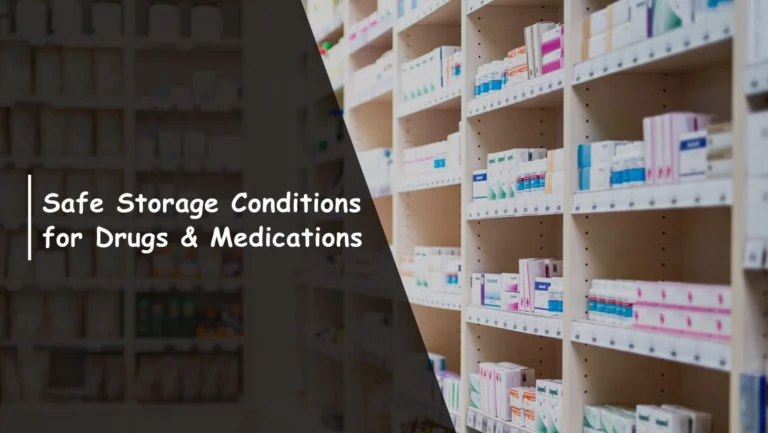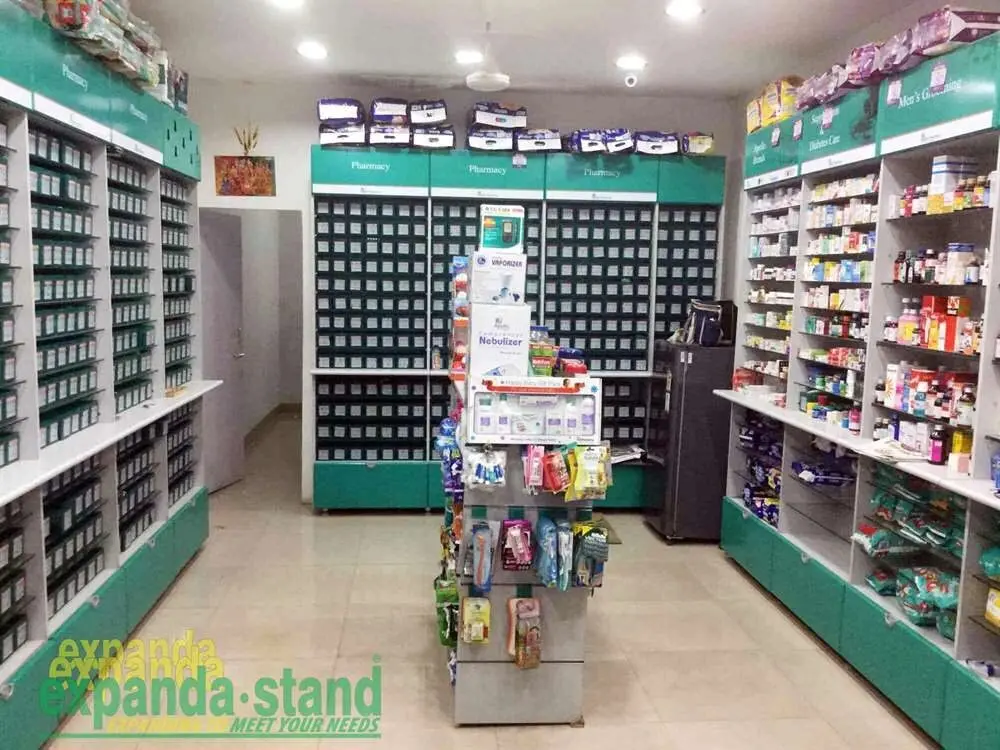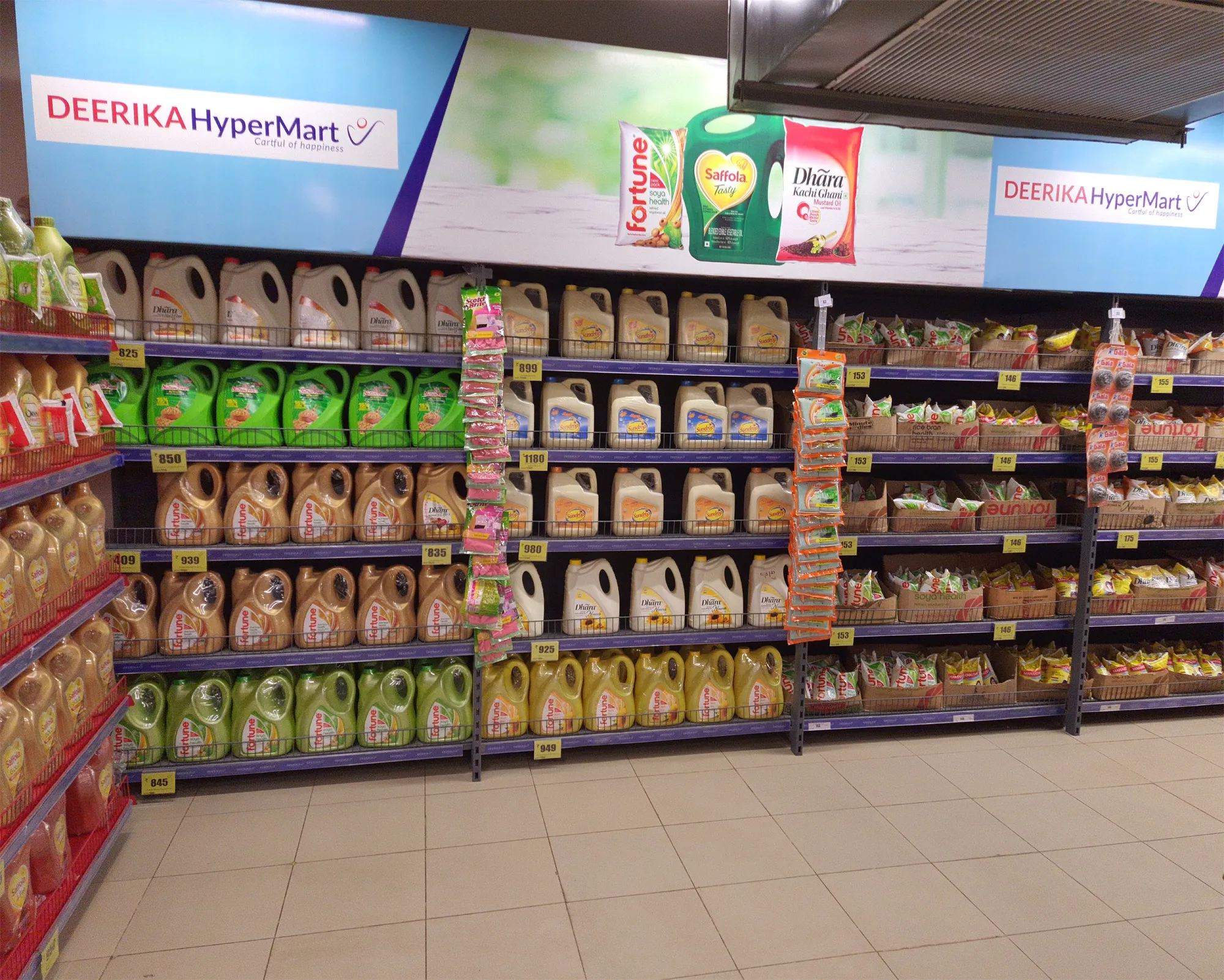Safe Storage Conditions for Drugs and Medications
Explore the key factors of storage conditions of drugs, including temperature, humidity, and security, to ensure the effectiveness and safety of pharmaceuticals.

Explore the key factors of storage conditions of drugs, including temperature, humidity, and security, to ensure the effectiveness and safety of pharmaceuticals.

When it comes to people’s health, the way drugs and medications are stored is crucial. If they're stored improperly, they can lose their effectiveness or, in the worst case, even become harmful. That’s why it’s essential to ensure everything is stored correctly to keep medications safe and functioning as intended.
In this blog, we’ll discuss key factors that affect how drugs should be stored, some best practices to follow, and how Expanda Stand’s storage solutions can help medical organizations meet these essential standards.
Proper storage conditions are essential to maintain the effectiveness, safety, and stability of medications. Here are the key reasons why correct storage is crucial:
Now, let’s look at the factors that affect the storage conditions for drugs.
Several key factors influence the proper storage conditions for drugs and medications, ensuring their safety, effectiveness, and longevity.
Given the critical role temperature plays in maintaining drug quality, Expanda Stand’s industrial storage racks, like pallet racks or cantilever racks, can be designed to incorporate temperature-controlled zones for storing temperature-sensitive medications, ensuring compliance with temperature storage guidelines.
These systems help businesses safely store drugs in environments that meet the required temperature parameters.
Now, while temperature is essential, there is another crucial factor to consider: humidity. Let's dive into its role in drug storage.

Also read: Cantilever Racking Systems: Maximize Your Storage Efficiency
Humidity plays a significant role in the stability of pharmaceutical products. Excess moisture can cause many drugs, especially in tablet or powder form, to degrade, lose potency, or even become toxic.
Moisture can also cause packaging to deteriorate, which might lead to contamination of the drug. Therefore, maintaining proper humidity levels is crucial to ensure that drugs retain their full efficacy.
Some medications, such as those in capsule or tablet form, are especially vulnerable to changes in humidity. Moisture can cause tablets to dissolve prematurely, leading to incorrect dosing or reduced effectiveness. For medications in liquid form, high humidity can promote microbial growth, which could render the drug unsafe.
In most cases, storing medications in a dry environment is essential. Certain medications, such as antibiotics or biologics, are susceptible to moisture and require controlled storage conditions.
To combat the effects of humidity, desiccants (moisture-absorbing substances) are often included in packaging. These desiccants help keep the medications dry and prevent degradation. Additionally, storage areas equipped with dehumidifiers or ventilated spaces can help reduce the risk of humidity damage.
Expanda Stand’s multi-tier racks and mezzanine racks provide an ideal solution for maintaining well-organised storage with better airflow, reducing the risk of humidity damage. These systems can be integrated into existing environments to ensure medications are stored in optimal conditions.
Having understood the impact of temperature and humidity, it is also essential to consider how light exposure affects the stability of drugs. Let’s explore this in more detail.
Also read: Essential Safety Measures for Mezzanine Racks: A Comprehensive Guide
Exposure to light can degrade certain drugs, particularly those in liquid form. Ultraviolet (UV) light can break down active ingredients and reduce the potency of medications. For example, drugs like nitroglycerin and certain antibiotics are highly sensitive to light and require storage in opaque or amber-coloured containers.
Pharmaceutical products that are particularly light-sensitive should be stored in dark, opaque containers or in light-controlled areas to prevent degradation. Ideally, these medications should be kept in dark, secure storage areas that shield them from both direct and ambient light.
Expanda Stand’s medical store rack solutions can be designed with enclosed shelving or secure units that limit light exposure while offering convenient access to stored medications. This ensures both product visibility and the preservation of medication quality.
Along with light exposure, another important consideration for safe drug storage is ensuring security. Let’s take a look at the measures that should be implemented to keep your pharmaceuticals safe.
You might also like: Best benefits of pharmacy display racks
Security is another key element in maintaining safe storage conditions for drugs. Pharmaceuticals, especially controlled substances like opioids or psychotropic drugs, must be stored in a secure environment to prevent theft or misuse. The storage conditions of drugs must meet regulatory standards for security to comply with the law and protect public health.
Expanda Stand’s filing compactors and secure shelving systems are ideal for storing sensitive and high-value medications. These systems are designed with security in mind and can be easily locked to prevent unauthorised access.
Now that we’ve covered the main factors involved in storing drugs—temperature, humidity, light, and security—it’s time to look at the best practices to keep your pharmaceutical storage in top condition.
To ensure that medications are stored in optimal conditions, it’s essential to follow industry best practices. Here are some of the most important steps you can take:
Next, let’s look at how Expanda Stand’s storage solutions can support pharmaceutical businesses in maintaining these best practices.
When it comes to pharmaceutical storage, Expanda Stand provides a range of solutions designed to meet the industry’s unique needs. From secure, temperature-controlled storage to efficient retail display systems, their solutions are built for safety, functionality, and compliance.
Expanda Stand’s Key Storage Solutions for Pharmaceuticals:
Whether you need industrial storage systems, retail displays, or custom manufacturing, Expanda Stand delivers quality and reliable solutions for your business.
The safe storage conditions of drugs are essential to ensuring their effectiveness and safety. Maintaining proper temperature, humidity, light, and security helps protect medications and prevent loss.
Expanda Stand’s industrial storage racks, secure shelving systems, and retail display solutions are designed to meet all these requirements. Investing in the right storage solutions ensures the longevity and quality of your pharmaceutical products.
Need reliable storage solutions for your business? Contact Expanda Stand for tailored storage systems that ensure the safety and efficiency of your drug storage.
Medications should be stored at the right temperature, in a dry place, and away from direct light. Some need to be kept cold, while others are fine at room temperature.
The six rights of safe medicine administration are crucial for patient safety. First, ensure the right patient gets the right drug in the right dose. Check the right route of administration, whether oral or intravenous. Timing is important, so give it at the right time, and make sure all details are recorded as part of the right documentation. These steps ensure safe and effective medication administration.
The WHO provides guidelines on storing pharmaceuticals, focusing on temperature, humidity, and light to maintain their quality and safety. These recommendations apply to various storage environments, ensuring medications stay effective throughout their shelf life.
Keep meds in locked storage, control temperature and humidity, regularly check inventory, use clear labels, and limit access to authorised personnel.




Ready to Upgrade Your Process Operations?